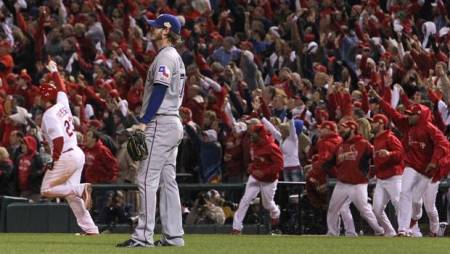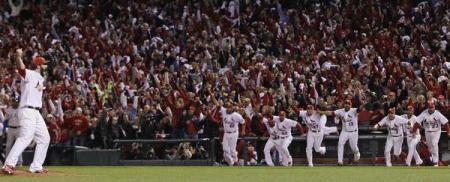
David Freese and teammates celebrate as Mark Lowe hangs his head (DMN photo)
I have to admit, when Jason Motte gave up that 2-run homer to Josh Hamilton in the 10th, my heart sank. Motte had already blown a save in Game 2, wasting a terrific performance by starter Jaime Garcia, and we had the tail end of the order coming up.
One announcer called this the greatest poorly-played World Series game ever, and he wasn’t far wrong, particularly from the Cardinals’ point-of-view. They had more errors than hits through the 5th. David Freese, later the hero, dropped a pop fly any 8-year-old could have caught, setting up another Rangers’ score. Matt Holliday got picked off 3rd with one out and the bases loaded. Until the 9th, Pujols went 0-4. I lost track of the number of missed scoring opportunities.
But they battled back. Freese turned on a 98 mph fastball on a 1-2 count and tripled in the bottom of the 9th to tie it. Theriot and Berkman drove in runs to tie it again in the 10th after Hamilton’s homer. Then Freese went from Bill Buckner to Bill Mazeroski and sent a 3-2 from Mark Lowe into the seats for the first walk-off WS homer in Cardinal history.
Jayson Stark at ESPN, lists reasons why the Cardinals can say this was a great game:
• They should say they were a part of the first World Series game in history in which a team got down to its final strike, its final breath, twice — once in the ninth inning, once in the 10th inning — and somehow won.
• They should say they were a part of the first World Series game ever played in which any team trailed five different times — and still came back to win.
• They should say they were a part of the first World Series game ever in which a team found itself losing in the ninth inning and extra innings — yet still found a way to win.
• They should say they played in the first World Series game in history in which two different players — Josh Hamilton for the Rangers, then Freese for the Cardinals — hit go-ahead home runs in extra innings.
• They should say they were the first team in the 1,330-game history of postseason baseball to score in the eighth, ninth, 10th and 11th innings of any game.
Game 7 tonight. Just about everyone thinks Chris Carpenter will get the ball. We’ll see. This would be the second time in his career he’s pitched on 3 days’ rest. The first time, against the Phillies on October 2nd, he gave up four runs in less than 4 innings. He has been solid, but not outstanding, against the Rangers in the Series. In Game 1, he pitched 6 innings, allowing 2 runs on 5 hits. The bullpen held, and the Cardinals won. In Game 5, he pitched 7 innings, allowing 2 runs on 6 hits, but his teammates couldn’t hold it, and the Cards lost. On short rest against a team that’s now seem him twice in 9 days, it will take more than his iron will to prevail. We may need some more offensive heroics, along with a bullpen that has to find the kind of moxie they showed earlier this month.
Later,




 Posted by scaypgrayce
Posted by scaypgrayce 

